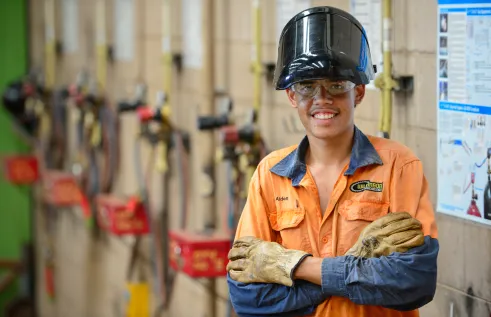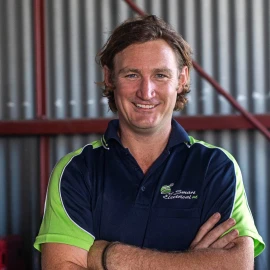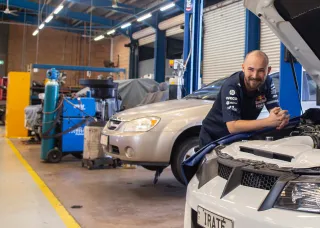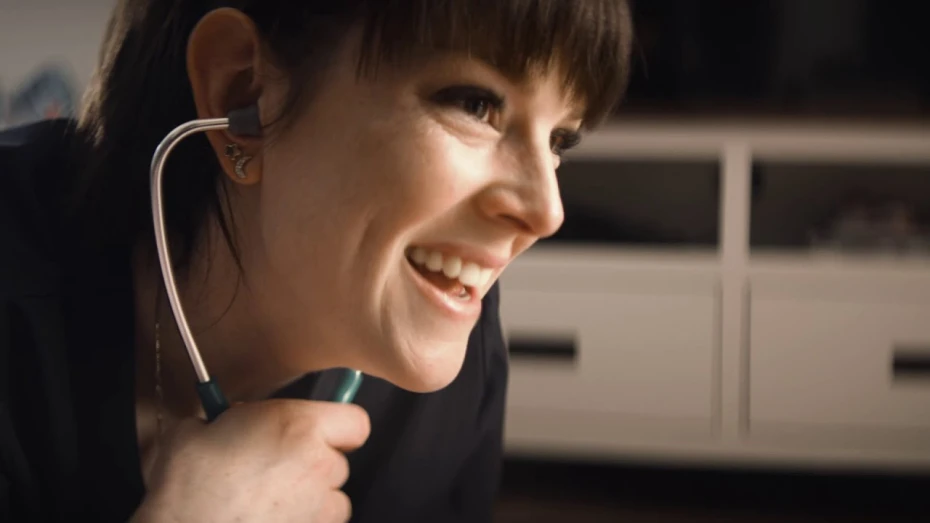Update your personalisation settings to view information about this course.
This course is only available to Domestic students and your preference is currently set to International.
This course is only available to International students and your preference is currently set to Domestic.
Key details
Duration
This program is delivered over a period of 3 years. The length of time to complete this qualification will depend on the location, study mode and/or units selected and will vary depending upon how long a student takes to reach the required competency level.
Intake
Locations
Entry requirements
View full entry requirementsCourse code
Overview
Availability: Applications are open for 2026.
Online Application: This course is not available or online application. Please contact the team on the details below for further information on how to apply.
Apprenticeships/Traineeships: This course can be undertaken as an apprenticeship. Visit TAFE Apprenticeships and Traineeships for more information.
This qualification reflects the role of individuals who perform a broad range of tasks when repairing and maintaining the body of cars, heavy vehicles and other vehicles in the automotive service and repair sector.
No licensing, legislative or certification requirements apply to this qualification at the time of publication.
| Delivery Details | |
| Location | Casuarina |
| Duration | 3 years *Duration may vary depending on how long a student takes to reach the required competency level |
| Study Mode | Face-to-face Simulated workplace Workplace |
| Start Date | January 12, 2026 - December 11, 2026 *Apprentices will receive an individual call-up notification letter. *A course timetable/study plan will be provided on application for the course. |
| Attendance | Block delivery 4 to 5 x 1 week blocks each year over 3 years Monday - Friday 8:00 am - 4:20 pm *Information relating to study modes can be found in the 2026 TAFE Student Guide |
Career opportunities
Possible occupations relevant to this qualification include:
- Vehicle Body Restoration Technician
- Panel Beater
- Heavy Vehicle Body and Chassis Repair Technician
Credit transfers and advanced standing
Skill recognition
Recognition of Prior Learning (RPL)
RPL is the acknowledgement of a person's skills and knowledge acquired through previous training, work or life experience, which may be used to grant status or credit in a subject regardless of how and where they were attained, including overseas.This can include skills from:
- Previous study excluding courses at another VET/TAFE institution, but including courses at school or college, through adult education classes or training programs at work;
- Work experience (including both work that is paid and unpaid); and/or
- Life experience (for example leisure pursuits or voluntary work).
RPL is a form of assessment. It is used to determine whether a person has acquired, through formal or informal learning, the skills and experience consistent with the stated competency standards that comprise a qualification. RPL is not time referenced, so there are no parameters on how or when the skills are acquired. However, the skills that have been acquired through life experience etc., must be current and must match the elements and performance criteria contained in the individual unit.
Students seeking RPL need to indicate this on their enrolment form at the time of enrolment.
For further information please refer to the Applicant's Guide to the Recognition of Prior Learning or contact Student Central on 1800 061 963 (free call) or email Student.Central@cdu.edu.au.
Credit Transfer
Charles Darwin University as a Registered Training Organisation recognises the Australian Qualifications Framework qualifications and Statement of Attainments issued by any other Australian Registered Training Organisation.
Students are encouraged to submit any requests for credit from previous studies at the time of enrolment, to ensure they are not enrolling in units they may not need to undertake.
In order to apply for exemption/credit transfer from units completed at another training organisation, you will need to complete an Application for Exemption Form available from any campus, centre, or team, or a copy of the form can be obtained from the web.
Your completed Application for Exemption form together with attached documentary evidence (certified copy of Qualification/Statement of Attainment) to support your request for exemption/credit transfer should be submitted directly to the University either in person or by mail. Requests without documentary evidence will not be processed and will be returned to students. There are no fees attached to Credit Transfers.
Pathways
VET to Higher Education Pathway Mapping for completed Awards in the same field or discipline.
Further training pathways from this qualification include but are not limited to AUR40720 Certificate IV in Automotive Body Repair Technology (not available at CDU).
Fees
2026 Fees
| Fee Type | 2026 Course Fees |
| NT Government supported* | $4,100.25 |
| Full Fee | $18,243.45 |
*This course is supported by the NT Government for eligible domestic students who are NT residents. A limited number of NT Government supported places are available, so secure your place now.
Fees shown are indicative and subject to change annually. Actual course fees may vary depending on the units chosen. International non-student visa-holders; study eligibility needs to be verified before enrolment. Fees may vary depending on the visa type.
For further clarification and information on fees, payment options, instalment plans, and refunds, contact CDU on 1800 061 963 or refer to TAFE Fees and Payments.
Fee exemptions
Exemptions apply to TAFE tuition fees for NTG supported courses only.
At the time of enrolment, students in these categories will be exempt from paying tuition fees:
- Recipient of a Centrelink payment
- Recipient of Department of Veterans Affairs benefits
- Enrolled Secondary Students
- Permanent residents with refugee or humanitarian status
Certified copy of the evidence must be provided at the time of enrolment.
If your course is delivered in a location that is listed on the NTG’s Location Categories for VET Funded Programs, with remote as the location category you may be eligible for the Remote 2 Location tuition fee exemption.
International VET Package
Course information flyer(s)

Why study trades at CDU?
Whether you're an apprentice, a trainee, or already working in the industry, our trades courses are for you.
Start your career or upskill in a variety of areas from construction and electrotechnology to plumbing and metal trades. Wherever your interest lies, you'll learn from experts with industry-standard technologies and tools so you can graduate workplace ready.
- NT's largest training provider
- Access to specialised trade training facilities
- Recognition of prior learning so you can qualify faster

Why study at CDU?
Study with the Northern Territory's largest training provider and gain industry-ready skills and experience.
- Access to first-class facilities
- Recognition of prior learning accepted
- Packages into higher education available for most courses

Why study trades at CDU?
Whether you're an apprentice, a trainee, or already working in the industry, our trades courses are for you.
Start your career or upskill in a variety of areas from construction and electrotechnology to plumbing and metal trades. Wherever your interest lies, you'll learn from experts with industry-standard technologies and tools so you can graduate workplace ready.
- NT's largest training provider
- Access to specialised trade training facilities
- Recognition of prior learning so you can qualify faster

Why study at CDU?
Study with the Northern Territory's largest training provider and gain industry-ready skills and experience.
- Access to first-class facilities
- Recognition of prior learning accepted
- Packages into higher education available for most courses
What will I study?
To achieve AUR32120 Certificate III in Automotive Body Repair Technology a total of thirty one (31) units of competency must be completed comprising seventeen (17) core and fourteen (14) elective units as detailed in the packaging rules and listed below.
Course structure
17 core units, plus
14 elective units, of which:
- 8 units from one of the specialist elective groups A to C must be chosen
- of the remaining units required to make up the elective unit total:
- up to 6 may be from the specialist elective groups and/or general electives
- up to 5 may be from a Certificate II qualification or above in this training package or other endorsed training package or accredited course
The total nominal hours for the sequence listed below is 1065.
| Code | Module/Unit of Competency | Hours |
| Core units of competency | ||
| AURAEA002 | Follow environmental and sustainability best practice in an automotive workplace | 25 |
| AURAFA108 | Interpret and apply automotive repair instructions | 20 |
| AURASA102 | Follow safe working practices in an automotive workplace | 20 |
| AURETR042 | Remove, refit and operate electrical components following body repair activities | 20 |
| AURETR125 | Test, charge and replace batteries and jump-start vehicles | 15 |
| AURTTK102 | Use and maintain tools and equipment in an automotive workplace | 20 |
| AURTTY001 | Repair vehicle chassis, frame and associated components | 80 |
| AURVTN003 | Remove and store vehicle body components | 20 |
| AURVTN022 | Repair vehicle body misalignment | 50 |
| AURVTN104 | Remove, replace and align bolt-on vehicle body panels and components | 90 |
| AURVTN116 | Repair vehicle body panels using filler | 35 |
| AURVTN120 | Remove and replace major welded panels on vehicles | 50 |
| AURVTN123 | Repair adhesive bonded structural damage on vehicles | 40 |
| AURVTN132 | Inspect vehicle damage and determine repair procedures | 40 |
| AURVTN135 | Apply original equipment manufacturer repair procedures during vehicle repairs | 20 |
| AURVTW103 | Carry out advanced gas metal arc welding on vehicle body sections | 30 |
| AURVTW105 | Carry out spot welding | 20 |
| Total nominal hours for core units | 595 | |
| Elective units of competency (Complete all 14) | ||
| Group A: Vehicle Body Repair | ||
| AURVTN005 | Remove and replace adhesive attached components on vehicles | 15 |
| AURVTN017 | Repair vehicle thermoplastic body panels and components | 30 |
| AURVTN029 | Set up and operate universal vehicle measuring systems | 20 |
| AURVTN031 | Carry out vehicle sectional repairs | 80 |
| AURVTN102 | Carry out non-structural vehicle panel repairs | 40 |
| AURVTN113 | Carry out paint-less dent repairs on vehicle body panels | 40 |
| AURVTN115 | Repair vehicle body panels using metal finishing | 35 |
| AURVTN119 | Repair vehicle structural damage by riveting | 30 |
| AURVTN128 | Identify and repair high strength steel vehicle components | 40 |
| Group B: Vehicle Body Restoration | ||
| AURVTN025 | Repair corroded vehicle body panels and components | 60 |
| General Elective Units | ||
| AURETH011 | Depower and reinitialise hybrid electric vehicles | 20 |
| AURETH101 | Depower and reinitialise battery electric vehicles | 10 |
| AURVTP005 | Apply rust prevention and sound deadening materials to vehicle body components | 20 |
| AURETR149 | Apply knowledge of ADAS technology in vehicle pre-repair scans | 30 |
| Total nominal hours for elective units | 470 | |
| Total nominal hours for the qualification | 1065 | |
Entry requirements
Admission criteria
A Language, Literacy, Numeracy and Digital Literacy (LLND) evaluation helps identify any areas where you may need additional support to help you achieve your goals.
To gain entry into AUR32120 Certificate III in Automotive Body Repair Technology candidates require:
- To be an Apprentice who has entered a Training Contract with their employer and Australian Apprenticeship Support Network NT.
- Understanding of basic computer skills, to navigate online learning materials and assessments.
No licensing, legislative or certification requirements apply to this qualification at the time of publication.
Required Resources
Students will also need to wear work clothing suited to the automotive industry such as:
- Steel cap boots
- Safety glasses
- Protective clothing
- Welding Mask and cotton long sleeve pants/clothing for welding units
Students are issued with learning materials and handouts relevant to each unit during their scheduled block.
Computer and internet access may be required to source information and complete assessments.
All of my lecturers were top notch former tradies with a solid grasp of what they were teaching. Whatever my issue was, they were always there for me. It was great.
Yron
CDU student

All of my lecturers were top notch former tradies with a solid grasp of what they were teaching. Whatever my issue was, they were always there for me. It was great.
Yron
CDU student

Course details
Accreditation
This is a current, nationally accredited qualification from the AUR Automotive Retail, Service and Repair Training Package .
Location and study mode
Delivery at all locations is subject to sufficient demand and resources.
Locations: Casuarina
Study Mode: On campus, workplace assessment
Subject to demand other locations and modes may become available throughout the year.
Additional information
Contact details
Automotive and Mobile Plant |
You make CDU
Together we are a positive force for change in our communities and the world.
You make CDU
Our students choose to study with us because we share the same vision – to make a positive change. Whatever your motivation is, we can guide you in the right direction.
You make CDU
Together we are a positive force for change in our communities and the world.
You make CDU
Our students choose to study with us because we share the same vision – to make a positive change. Whatever your motivation is, we can guide you in the right direction.
How to apply
How to apply for domestic students
CDU TAFE has several pathways for you to apply.
Visit How to apply for CDU TAFE courses for more information.
Admission requirements for domestic students
Before applying, you may want to check if you meet the admission requirements for studying with CDU.
CDU has many pathways to study, so don't worry if you don't meet the admission requirements right now. There is a study pathway to get you started on your journey.
Not sure if you are a domestic or international student?
That's OK - it can be a little tricky to know the difference.
To help you out, we've put together a guide to answer any questions you might have.
How to apply for international students
Applications to CDU must be submitted online.
The process is simple, all you need is a valid email address to create your online account.
Once you have started the application you will have the option of saving your application and resuming it at a later date.
There is no application fee when you apply online.
Find a CDU agent partner
Applicants may seek further information about international education in Australia from the Australian Government Department of Education and Training or from our overseas / external representatives.
To help with the process, we've compile a list of authorised representatives.
Not sure if you are a domestic or international student?
That's OK - it can be a little tricky to know the difference.
To help you out, we've put together a guide to answer any questions you might have.
Things like the difference between domestic and international students or the difference between course types like TAFE and undergraduate.



Share this course